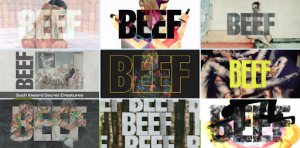I have no beef with Netflix’s “Beef”

May 1, 2023
Beef, one of Netflix’s most highly acclaimed original series, premiered on April 6. The show, produced by A24, features a predominantly Asian cast with Steven Yeun and Ali Wong front and center. The show has achieved an impressive 98% approval rating on Rotten Tomatoes and has wowed audiences with its originality, plot and acting. Some viewers have even dubbed it as the best original series on Netflix.
The show begins with the central conflict that drives the ten-episode series: a road rage incident. While Danny Cho (Yeun) is backing out of a parking spot at a grocery store, he almost collides with a white Mercedes that belongs to Amy Lau (Wong). Amy honks at him, flips him off and drives away, with Danny following her. For the next several minutes, a car chase ensues.
It’s chaotic, it’s comedic, it’s captivating.
This incident sets off a series of retaliations between Danny and Amy, leading them to become entangled in each other’s complex lives.
One of the most compelling aspects of “Beef” is its characters. Each character deals with some level of sadness that is masterfully developed throughout the ten-episode series. Danny struggles with financial instability and providing for his family. He lacks control over his work life and his brother. Amy, who operates a plant-selling business, has built a wealthy life for her husband and her young daughter, but cannot enjoy it herself due to her busy work schedule.
Like Danny, Amy lacks control in her business. But unlike Danny, she enjoys a life of wealth and stability.
Because of their situations, each of them use the road rage incident to bring control into their own lives. Danny uses the incident to go against the wealthy and the capitalist system, represented by Amy. Amy uses the incident as a release of pent-up frustration and anger that comes from her work and home life.
Interwoven with the character plots are a variety of well-written, heavy topics, specifically generational trauma and depression. However, with the balance of comedy, the show never feels too heavy or too light-hearted.
Both Yeun and Wong put on enthralling performances as Danny and Amy. In some moments, viewers can sympathize with the struggles and pain each of them face. In others, Yeun and Wong make viewers frustrated and upset with each of their character’s unfavorable decisions. But that’s the beauty of the show. Each character is human and flawed. The characters–even the side characters that may not have the same screen time as the protagonists–are so well-written that viewers can’t help but cry, laugh and sit at the edge of their seats in perplexion.
Another feature that sticks out in “Beef” is the soundtrack and creative direction. The soundtrack–full of nostalgic ‘90s and early 2000s songs– conveys the duality of humor and heaviness within the show.

Furthermore, every episode starts with a jarring piece of artwork with the title card. The paintings represent the predominant conflict in each of the episodes–loneliness, betrayal, generational trauma.
What makes the show so special and loved among audiences is the originality and unpredictability. None of the events that transpire after the road rage incident are predictable to audiences. The show perfectly depicts how far a single decision can go. By the end of the series, viewers will question if they’re watching the same show they started nine episodes ago.
